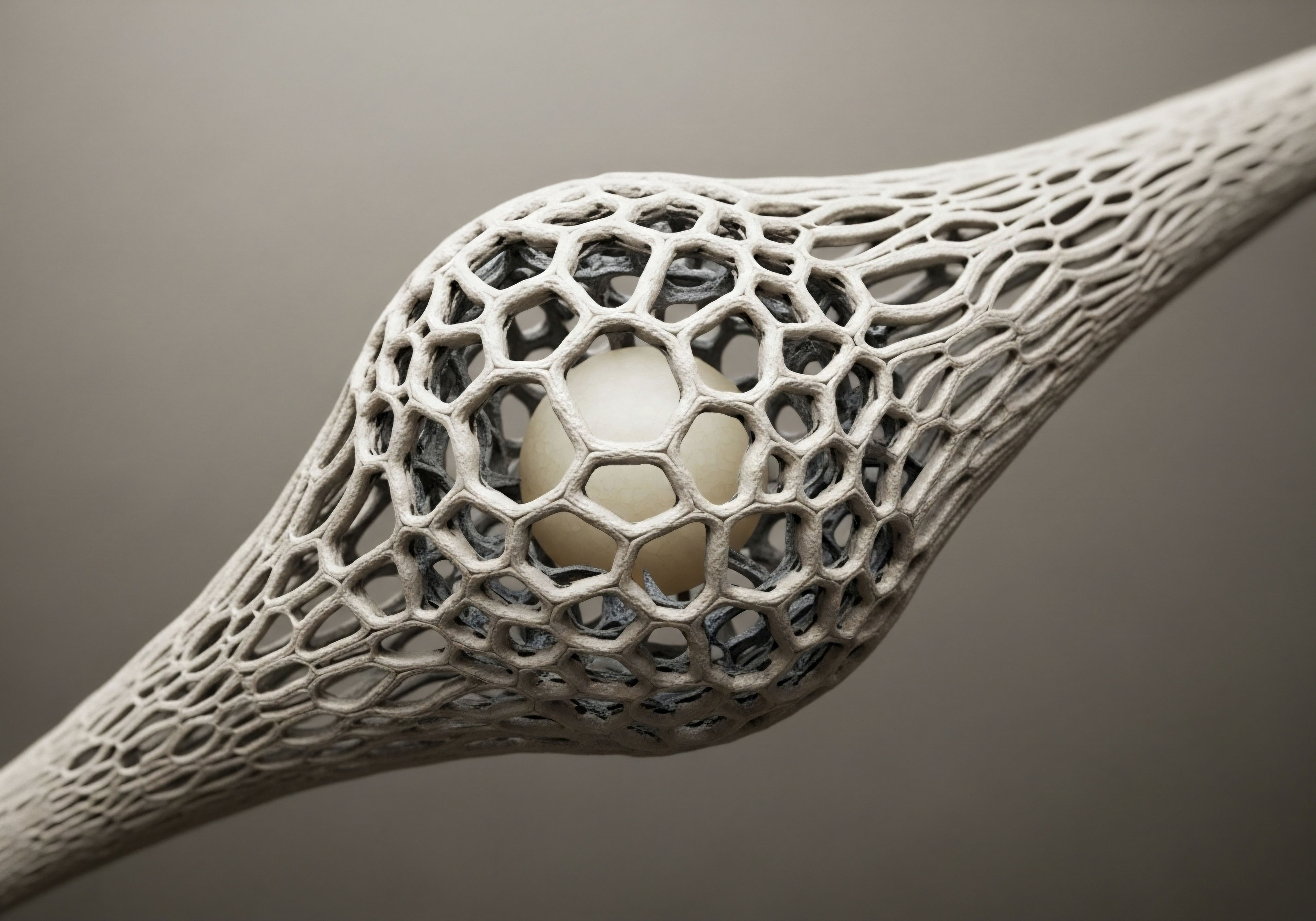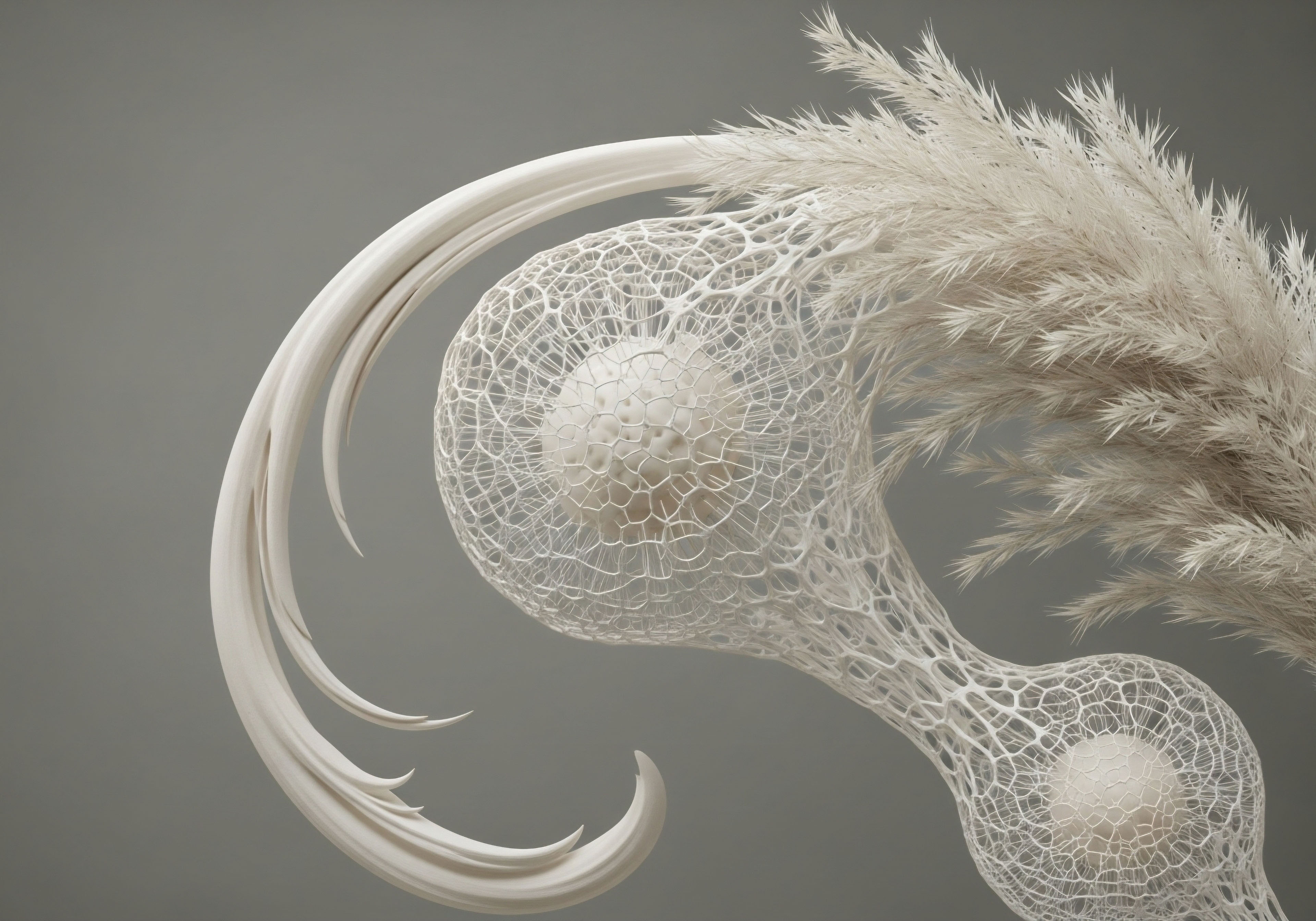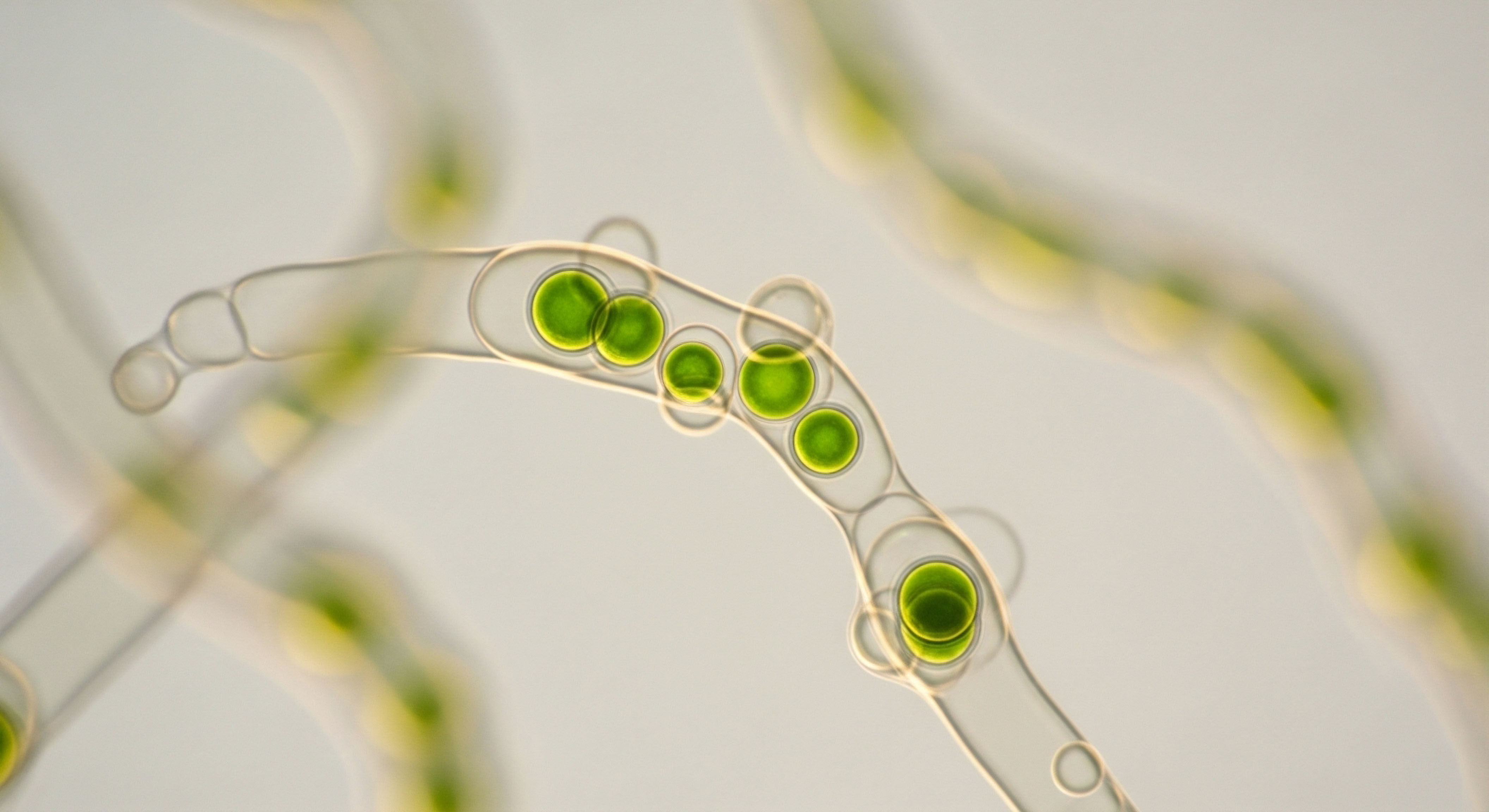

Fundamentals
Have you ever woken up feeling as though your body did not quite complete its nightly restoration? Perhaps a lingering sense of fatigue, a subtle dullness in your mental clarity, or a feeling that your physical recovery from the day’s demands was incomplete.
Many individuals experience these sensations, often without fully understanding the intricate biological processes that govern our nightly repair and rejuvenation. Your body possesses an inherent capacity for self-renewal, a sophisticated system designed to recalibrate and rebuild while you rest. Understanding these internal mechanisms provides a pathway to reclaiming vitality and function without compromise.
At the heart of this nightly renewal lies growth hormone, a potent messenger synthesized and released by the pituitary gland, a small but mighty endocrine center located at the base of your brain. This hormone is not solely for childhood growth; it remains a vital component of adult physiological well-being.
It orchestrates a symphony of repair processes, influencing everything from cellular regeneration and tissue repair to metabolic regulation and body composition. Optimal levels of this hormone contribute to maintaining lean muscle mass, supporting healthy bone density, and aiding in the body’s ability to metabolize fats efficiently.
Growth hormone is a central orchestrator of nightly bodily repair and metabolic balance.
The release of growth hormone follows a distinct, pulsatile pattern, with the most substantial bursts occurring during specific phases of sleep. This is particularly true during slow-wave sleep (SWS), often referred to as deep sleep. As you descend into these restorative sleep stages, your brain signals the pituitary gland to release a significant surge of growth hormone.
This nocturnal secretion is a cornerstone of physiological restoration, facilitating the repair of tissues, the synthesis of proteins, and the overall maintenance of cellular integrity. The quality and duration of your deep sleep directly influence the amplitude and frequency of these vital hormonal pulses.
Consider the many benefits associated with robust growth hormone activity ∞
- Tissue Regeneration ∞ Supports the repair of muscles, bones, and other tissues damaged during daily activity.
- Metabolic Regulation ∞ Aids in the efficient utilization of fats for energy, contributing to a healthy body composition.
- Cellular Health ∞ Promotes the turnover and health of cells throughout the body, supporting overall physiological resilience.
- Physical Recovery ∞ Assists in reducing recovery time after physical exertion, enhancing athletic performance and daily energy.
- Cognitive Support ∞ Contributes to mental clarity and overall brain function, indirectly supporting cognitive vitality.
Many individuals turn to alcohol as a means to relax or to initiate sleep, perceiving its sedative properties as beneficial. While alcohol may indeed shorten the time it takes to fall asleep, this initial effect masks a deeper disruption to the body’s natural sleep architecture and hormonal rhythms.
The immediate sensation of drowsiness can be misleading, as the underlying biological processes essential for true restoration are compromised. This interference extends directly to the delicate dance of growth hormone secretion that is so critical for your body’s nightly repair work.


Intermediate
The impact of alcohol on the body’s internal messaging service, particularly concerning growth hormone, extends beyond simple sedation. When alcohol enters your system, it initiates a cascade of physiological responses that directly interfere with the natural, pulsatile release of growth hormone during sleep.
Studies have consistently shown that even moderate alcohol consumption can suppress nocturnal growth hormone secretion by a significant margin, often reducing it by 70% to 75% compared to nights without alcohol intake. This substantial reduction compromises the body’s capacity for repair and regeneration.
This suppression is not merely an acute event; research indicates that the inhibitory effects on growth hormone secretion persist even with repeated alcohol administration over several nights. This suggests that the body does not readily adapt to alcohol’s presence in a way that preserves optimal hormonal function.
The initial increase in slow-wave sleep that some individuals experience after consuming alcohol can be deceptive. While deep sleep might appear enhanced in the early part of the night, the critical hormonal release associated with this sleep stage is independently and significantly diminished. This dissociation between sleep architecture and hormonal output highlights the complex and often counterintuitive ways alcohol influences our internal systems.
Alcohol significantly reduces growth hormone release, even as it alters sleep patterns.
Beyond its direct effect on growth hormone, alcohol profoundly alters the overall architecture of sleep, the carefully choreographed sequence of sleep stages essential for comprehensive restoration.
- REM Sleep Disruption ∞ Alcohol delays the onset of rapid eye movement (REM) sleep and reduces its total duration. REM sleep is vital for cognitive processing, emotional regulation, and memory consolidation.
- Fragmented Sleep ∞ As the body metabolizes alcohol, its sedative effects wear off, leading to more frequent awakenings and lighter sleep in the latter half of the night. This fragmentation prevents sustained periods of deep, restorative sleep.
- Increased Light Sleep ∞ While initial deep sleep may increase, the overall quality of sleep suffers due to an increase in lighter sleep stages and disruptions.
These sleep disturbances, combined with the direct suppression of growth hormone, have broader implications for metabolic health and physical recovery. Growth hormone plays a central role in maintaining lean body mass, regulating fat metabolism, and supporting cellular repair. When its nocturnal secretion is consistently inhibited, the body’s ability to perform these functions is compromised. This can lead to less effective recovery from exercise, a greater propensity for fat accumulation, and a general feeling of reduced vitality.
For individuals pursuing personalized wellness protocols, such as Growth Hormone Peptide Therapy or Testosterone Replacement Therapy (TRT), understanding alcohol’s impact is particularly relevant. Peptide therapies, including agents like Sermorelin, Ipamorelin, and CJC-1295, are designed to stimulate the body’s natural production and release of growth hormone.
Introducing alcohol into this regimen can counteract the intended benefits, potentially rendering these carefully calibrated protocols less effective. While direct interactions between alcohol and these peptides are not always clinically significant in terms of immediate adverse reactions, the physiological antagonism on growth hormone secretion is undeniable.
Consider the effects of alcohol on the body’s hormonal landscape ∞
| Hormonal System | Alcohol’s Effect | Consequence for Well-being |
|---|---|---|
| Growth Hormone Axis | Significant suppression of nocturnal release. | Impaired tissue repair, reduced fat metabolism, compromised recovery. |
| Hypothalamic-Pituitary-Adrenal (HPA) Axis | Acute increase in cortisol (stress hormone). | Increased physiological stress, disrupted sleep quality, potential for anxiety. |
| Hypothalamic-Pituitary-Gonadal (HPG) Axis | Can lower testosterone levels in men, increase estrogen. | Reduced libido, muscle mass, energy, and altered body composition. |
| Melatonin Secretion | Inhibits the release of this sleep-signaling hormone. | Disruption of circadian rhythm, difficulty initiating and maintaining sleep. |
The intricate balance of the endocrine system means that disrupting one hormonal pathway often creates ripple effects across others. Alcohol’s influence on growth hormone is not an isolated event; it contributes to a broader physiological imbalance that can undermine efforts to optimize health and vitality. For those seeking to recalibrate their systems through targeted interventions, minimizing alcohol intake becomes a strategic choice to support the body’s innate capacity for restoration.


Academic
The precise mechanisms by which alcohol interferes with growth hormone secretion during sleep involve a complex interplay within the neuroendocrine system, particularly impacting the hypothalamic-pituitary axis. This central regulatory system orchestrates the release of numerous hormones, including growth hormone.
The primary regulators of growth hormone release are two hypothalamic peptides ∞ growth hormone-releasing hormone (GHRH), which stimulates its secretion, and somatostatin (SS), which inhibits it. The pulsatile nature of nocturnal growth hormone release is largely governed by the fluctuating balance between these two opposing forces.
Alcohol exerts its inhibitory effect on growth hormone primarily at the hypothalamic level. Research indicates that alcohol can disrupt the normal control of the somatotropic axis, the pathway involving GHRH, growth hormone, and insulin-like growth factor 1 (IGF-1).
This disruption may involve an alteration in the synthesis or release of GHRH, or an enhancement of somatostatin activity, thereby tipping the balance towards inhibition of growth hormone. The exact molecular targets within the hypothalamus are still under investigation, but evidence points to alcohol’s influence on various neurotransmitter systems that modulate GHRH and somatostatin release.
Alcohol disrupts the delicate hypothalamic balance governing growth hormone release.
One significant pathway involves alcohol’s interaction with the GABAergic system. Alcohol is known to enhance the activity of gamma-aminobutyric acid (GABA), the brain’s primary inhibitory neurotransmitter. While this contributes to alcohol’s sedative effects, it can also suppress neuronal activity in hypothalamic regions responsible for GHRH release.
Additionally, alcohol can influence opioid pathways, with increased beta-endorphin levels observed after alcohol exposure. Beta-endorphin, a hypothalamic opioid, is known to restrain the secretion of luteinizing hormone-releasing hormone (LHRH), and similar inhibitory effects on GHRH pathways are plausible, contributing to the overall suppression of growth hormone.
The profound reduction in nocturnal growth hormone secretion has significant metabolic and physiological consequences. Growth hormone is a key regulator of lipid metabolism, promoting the breakdown of stored fats and their utilization for energy. Chronic suppression of this hormone can contribute to alterations in body composition, including increased visceral adiposity and reduced lean muscle mass.
It also plays a role in insulin sensitivity; a sustained reduction in growth hormone can indirectly affect glucose homeostasis, potentially contributing to metabolic dysregulation over time. The body’s capacity for cellular repair and protein synthesis, both heavily reliant on adequate growth hormone, is also compromised, impacting overall tissue integrity and resilience.
How does alcohol consumption influence the body’s repair mechanisms?
The interconnectedness of the endocrine system means that alcohol’s impact is rarely isolated to a single hormone. Its effects on growth hormone secretion are often accompanied by disturbances in other vital hormonal axes.
- HPA Axis Dysregulation ∞ Alcohol acutely stimulates the hypothalamic-pituitary-adrenal (HPA) axis, leading to increased cortisol levels. Elevated cortisol, a stress hormone, can directly antagonize growth hormone action and further disrupt sleep architecture, creating a vicious cycle that impedes recovery and promotes catabolic states.
- HPG Axis Compromise ∞ Alcohol also affects the hypothalamic-pituitary-gonadal (HPG) axis, responsible for reproductive hormone regulation. In men, chronic alcohol use can lead to reduced testosterone production and increased estrogen levels, partly due to direct testicular toxicity and altered liver metabolism of hormones. This hormonal imbalance further impacts muscle mass, energy levels, and overall vitality, compounding the effects of suppressed growth hormone.
- Thyroid Axis Influence ∞ While less direct, alcohol can also influence the hypothalamic-pituitary-thyroid (HPT) axis, potentially affecting thyroid hormone levels, which are critical for metabolic rate and energy production.
The long-term implications of chronic alcohol consumption on growth hormone secretion and overall endocrine balance extend to the broader concept of physiological resilience and longevity. Sustained suppression of growth hormone can accelerate aspects of biological aging, impacting skin elasticity, bone density, and the body’s ability to recover from injury or illness.
For individuals seeking to optimize their health span and maintain peak function, understanding these deep biological ramifications is paramount. Supporting the body’s natural hormonal rhythms through informed lifestyle choices, including judicious alcohol intake, becomes a cornerstone of any comprehensive wellness strategy.
The goal of personalized wellness protocols, such as Testosterone Replacement Therapy (TRT) for men and women, or Growth Hormone Peptide Therapy with agents like Tesamorelin or Hexarelin, is to restore and optimize these very hormonal balances. When alcohol consistently undermines the body’s natural growth hormone production, it creates an uphill battle for these interventions.
For instance, while a patient might be receiving exogenous testosterone to address symptoms of low androgen levels, concurrent alcohol use could be simultaneously diminishing their endogenous growth hormone output, thereby limiting the full spectrum of benefits related to body composition, recovery, and overall vitality that optimal hormonal balance provides.
How does alcohol consumption affect metabolic markers?
| Sleep Stage | Normal GH Secretion | Alcohol’s Acute Effect | Alcohol’s Chronic Effect |
|---|---|---|---|
| Slow-Wave Sleep (SWS) | Primary peak of GH release. | Initial increase in SWS duration, but GH release suppressed. | SWS returns to baseline, GH suppression persists. |
| Rapid Eye Movement (REM) Sleep | Minimal direct GH release. | Delayed onset, reduced total duration. | Continued reduction in total REM sleep. |
| Overall Sleep Quality | Restorative, consolidated cycles. | Fragmented sleep, increased awakenings. | Poor sleep quality, reduced total sleep time. |
The intricate dance between sleep architecture and hormonal signaling is a testament to the body’s sophisticated regulatory systems. Alcohol, by disrupting this dance, not only impairs immediate recovery but also sets the stage for long-term physiological imbalances. A comprehensive approach to health demands a clear understanding of these interactions, empowering individuals to make choices that truly support their biological systems and their pursuit of sustained vitality.

References
- Prinz, P. N. Roehrs, T. A. Vitaliano, P. P. Linnoila, M. & Weitzman, E. D. (1980). Effect of alcohol on sleep and nighttime plasma growth hormone and cortisol concentrations. Journal of Clinical Endocrinology and Metabolism, 51(4), 759-764.
- Ekman, R. Fagerström, R. & Wålinder, J. (1996). Alcohol and sleep ∞ effects on growth hormone secretion at two different doses. Psychoneuroendocrinology, 21(2), 169-176.
- Takahashi, Y. Kipnis, D. M. & Daughaday, W. H. (1968). Growth hormone secretion during sleep. Journal of Clinical Investigation, 47(9), 2079-2090.
- Van Cauter, E. & Plat, L. (1998). Interrelations between sleep and the somatotropic axis. Sleep, 21(5), 553-566.
- Simasko, S. M. (2012). Mechanisms of Alcohol Effects on Sleep. Grantome.
- Gianoulakis, C. (1990). The effect of alcohol on the brain opioid system. Alcohol and Alcoholism, 25(3), 221-228.
- Wand, G. S. (2006). Alcohol and the hypothalamic-pituitary-adrenal axis. Alcohol Research & Health, 29(4), 263-268.
- Emanuele, M. A. & Emanuele, N. V. (2001). Alcohol and the male reproductive system. Alcohol Health & Research World, 25(4), 282-287.
- Prinz, P. N. Roehrs, T. A. Vitaliano, P. P. Linnoila, M. & Weitzman, E. D. (1980). Sleep, Sleepiness, and Alcohol Use. Alcohol Research & Health, 25(4), 273-281.
- Mendelson, W. B. Sitaram, N. Wyatt, R. J. Gillin, J. C. & Jacobs, L. S. (1978). Methscopolamine inhibition of sleep-related growth hormone secretion ∞ evidence for a cholinergic secretory mechanism. Journal of Clinical Investigation, 61(6), 1683-1690.

Reflection
As you consider the intricate dance between alcohol, sleep, and your body’s vital hormonal systems, perhaps a deeper understanding of your own physiological landscape begins to take shape. The journey toward optimal health is not about rigid adherence to external rules, but rather about cultivating a profound awareness of your internal environment. Each choice you make, from what you consume to how you prioritize rest, sends a signal through your biological networks.
This knowledge is not meant to be a source of judgment, but a powerful tool for self-guidance. It invites you to observe your own responses, to connect subjective feelings of vitality or fatigue with the objective realities of your endocrine function.
Your body is constantly striving for balance, a state of physiological harmony that supports your highest potential. Understanding how external factors, like alcohol, can influence this delicate equilibrium empowers you to make conscious decisions that align with your aspirations for sustained well-being.
Consider this exploration a starting point, a catalyst for deeper introspection into your personal health narrative. The path to reclaiming vitality is unique for every individual, often requiring personalized guidance to navigate the complexities of hormonal recalibration and metabolic support. What steps might you take to honor your body’s innate intelligence and support its nightly restorative processes?



